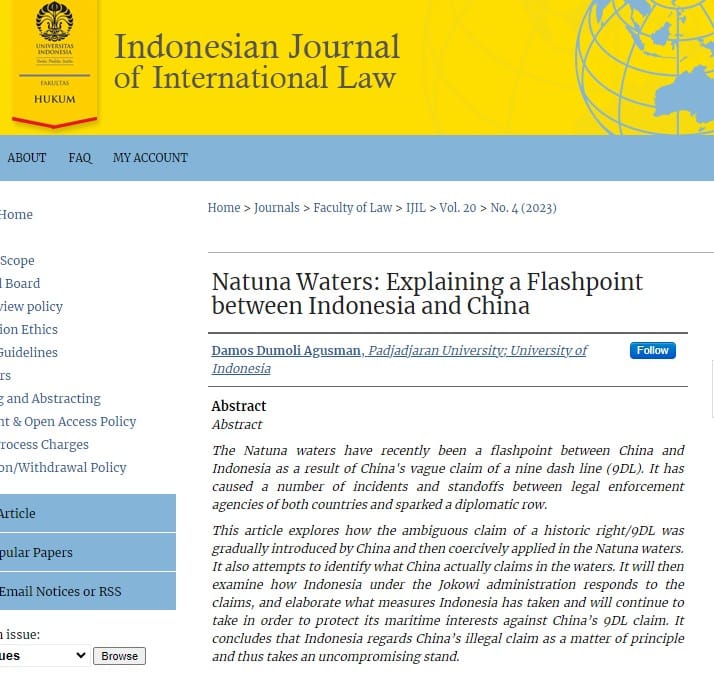We’re asking contributors to put together their own short collected observations like this one – and as always, if you’ve got an idea to pitch for The Interpreter, drop a line via the contact details on the About page.
Indonesia’s diplomacy is often regarded as not forceful enough, particularly about South China Sea disputes. When the Chinese survey vessel Haiyang Dizhi Shihao manoeuvred near an Indonesian oil rig inside the Indonesian Exclusive Economic Zone of the North Natuna Sea for almost a month in 2021, many analysts attributed Jakarta’s mute response to its economic relations with Beijing.
But an interesting new article by Damos Agusman, a former chief legal adviser at the Indonesian Foreign Ministry, published by the Indonesian Journal of International Law, reveals Indonesia's strategy behind the silence.
“The Chinese view was always silent if not ambiguous and was designed to be that way,” Agusman writes about the boundaries of China’s notorious “nine-dash line”. And while Indonesia’s “silent response” in turn invited criticism, observers missed what he describes as the “smart tactical approach taken by Indonesia”.
Contrary to public expectation, which tends to expect Indonesia to take a confrontational response to China’s illegal activities, the final outcome of this standoff is surprisingly in favour of Indonesia's legal position. It could represent the Javanese saying of ‘menang tanpa ngasorake’, which means winning the war without shaming the enemies.
Indonesia made its priority completing the drilling project conducted by Premier Oil Company under Indonesia’s license, rather than resorting to “megaphone diplomacy” as had been done previously and the resulting tension would only favour China. Instead, Agusman writes, “success could demonstrate that Indonesia persisted [with] its legitimate rights to drill in the Natuna waters.”

It’s a fascinating contrast with the experience Agusman describes for Vietnam in a similar situation when the Chinese Coast Guard intruded on oil exploration in Vanguard Bank, off Vietnam’s southeastern coast. Hanoi decided to respond in a confrontational manner, only for the oil drilling company in Vietnam to decide to leave the project.
In Indonesia’s case, the goal was to see the oil exploration continue so as to assert its legal rights. Premier Oil successfully completed its exploration despite the intrusion from the Chinese survey vessel as well as coast guard ships. And this strategy might also go some way to explaining the decision to conduct the forthcoming ASEAN joint military drills in the North Natuna Sea, to strengthen Indonesia’s position against China’s claim of its nine-dash line without having a direct confrontation.
Sometimes it pays to put away the loud hailer.

